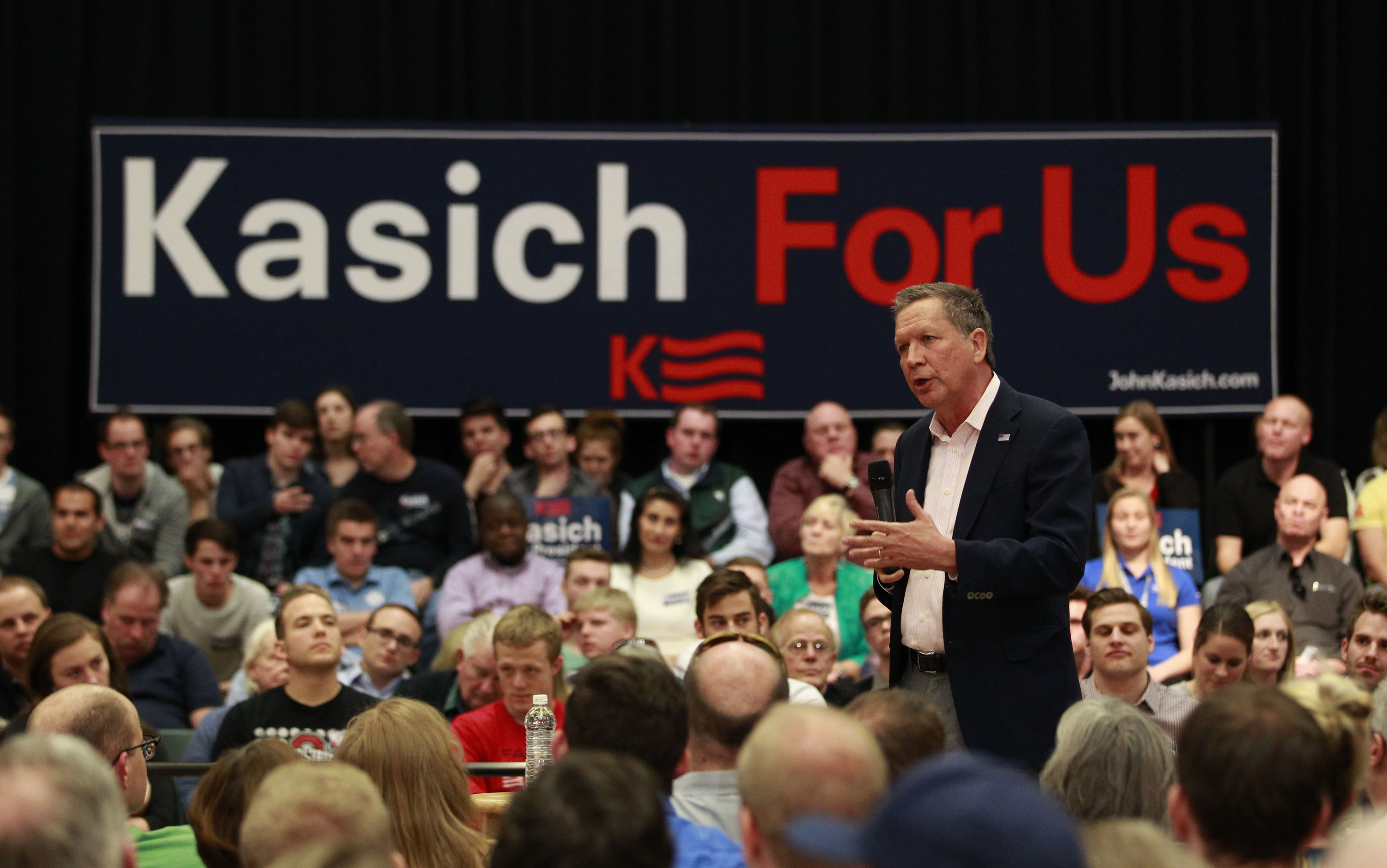
Could John Kasich be single-handedly destroying a political party?
Either by helping Donald Trump win the Republican nomination or by dragging the party into an ugly contested convention, Kasich seems to be causing a lot of trouble.
Serious presidential candidates normally leave the race when they no longer have a chance to win. This is an important part of how the nomination system functions. If losers drop out, then voters in subsequent states -- voters who might not follow politics enough to know which candidates are serious contenders and which aren't -- won’t waste their voters on the also-rans.
Winnowing is how most nomination fights are decided: Eventually, only one candidate, the winner, remains. That’s important too, because (as we’re learning now) the national conventions aren’t really well-equipped to function as decision-making bodies. Decisions are supposed to be made in the primaries and caucuses.
For a nomination season that has seemed chaotic at times, winnowing has – with this one exception – proceeded exactly as one would expect. Fears that super-PACs or social media or whatever else would disrupt the normal functioning of the system proved mostly unfounded. Scott Walker, Chris Christie, Jeb Bush, Ben Carson, Marco Rubio: All of them proved capable of raising plenty of money, but none of them survived defeats at the polls.
Except for John Kasich.
The Ohio governor chose to campaign as a moderate, despite having at least as conservative a record as previous GOP candidates such as John McCain and Mitt Romney, or as Chris Christie and Jeb Bush in the current cycle. Kasich instead campaigned as if he were Jon Huntsman, the former Utah governor who ran in 2012: By emphasising his differences with conservative orthodoxy, instead of papering them over.
Kasich then chose to skip Iowa and focus on New Hampshire. This strategy has never produced a nominee since the Iowa caucuses became the first contest back in 1972. Candidates don't have to win in Iowa, but they do have to compete there.
After Iowa, there has never been a point where he should have remained in the race:
-- In New Hampshire, his 16 per cent was disappointing: Second place, but well behind Donald Trump, and only matching the 17 per cent Huntsman won in 2016.
-- South Carolina (8 per cent of the vote) and then Nevada (4 per cent) were wipeouts.
-- On Super Tuesday, he lost one state he campaigned in – Vermont – and was clobbered in the other, Massachusetts. Meanwhile, he won less than 10 per cent of the vote in the other nine states.
-- He targeted Michigan on March 8 and managed to finish third there, while ignoring (and losing) several other states in the first half of the month.
-- Even on March 15, when he won in his own Ohio, he failed to impress overall, placing a distant third in Illinois and worse in the other three states.
Yet Kasich's choice to stay in the race has mattered. There’s a decent argument that he single-handedly destroyed Marco Rubio, who almost certainly would have had many more delegates if Kasich had dropped out when it made sense to.
And his current campaign makes no sense at all. Kasich inexplicably declined to debate Ted Cruz on March 21 after Donald Trump dropped out of that debate, thus costing both candidates a decent-sized opportunity to impress voters.
Even weirder is his decision to campaign in Utah before that state’s caucuses on March 22. Utah has a 50 per cent winner-take-all trigger, and is thought to be a good Cruz state. If Kasich wants a contested convention, he needs Cruz to get that 50 per cent and win all of Utah's delegates, thereby locking out Trump. The Ohio governor has other states where he should be devoting his limited resources.
It’s as if his campaign strategist was a Magic 8 Ball.
If only Cruz and Trump remained, it’s possible Trump would just win. Cruz hasn’t shown the ability to win the votes of anyone but the most conservative Republicans, and perhaps he can’t. Theoretically, Kasich and Cruz could coordinate their efforts to focus on each candidate’s strengths (even given that Kasich’s strengths are still largely theoretical at this point). But apparently neither of these would-be Trump stoppers plays any better with others than does the man they’re chasing.
All in all, Trump couldn’t have asked for a better opponent.
If not before that, in the invisible primary when party actors choose from among the candidates.
Just to be clear: For those who have been following the debate about whether parties choose nominees, this is no defence of "party choice." Perhaps Kasich was the one factor preventing party choice from working this time. But if one idiosyncratic candidate is all it takes to defeat a theory, then that theory has a severe problem.
Because the entire game right now is preventing Trump from getting to 1,237. For that, it's better for Kasich if Cruz wins all of Utah's 40 delegates than if they are split, say, 20 for Cruz, 10 for Trump and 10 for Kasich. If Trump reaches 1,237, then it doesn't matter how many of the other delegates Kasich winds up with. - Bloomberg View